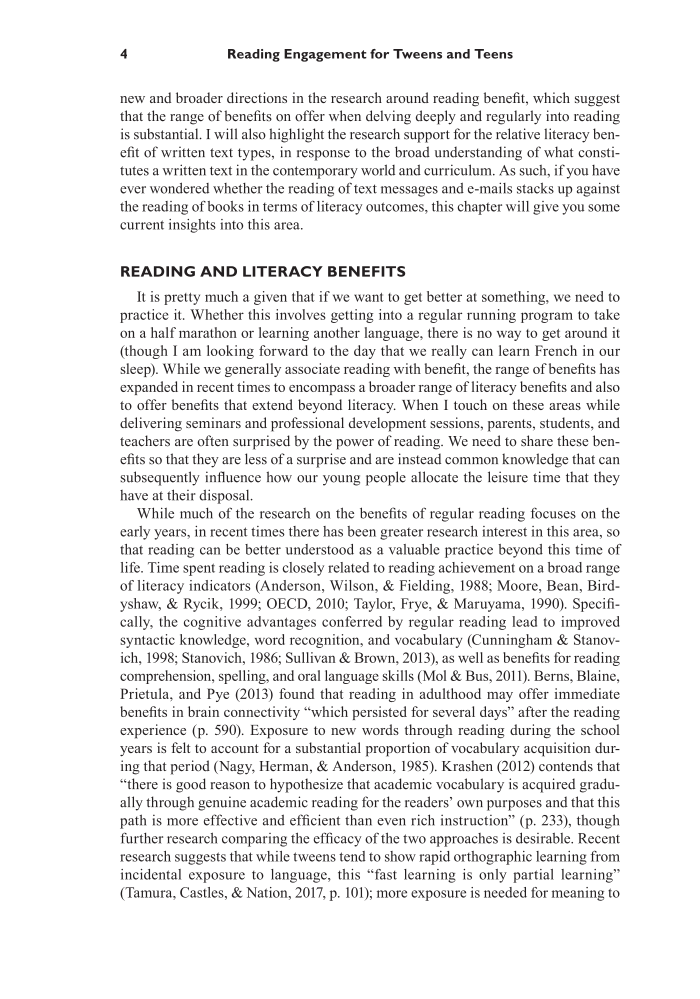4 Reading Engagement for Tweens and Teens new and broader directions in the research around reading benefit, which suggest that the range of benefits on offer when delving deeply and regularly into reading is substantial. I will also highlight the research support for the relative literacy ben- efit of written text types, in response to the broad understanding of what consti- tutes a written text in the contemporary world and curriculum. As such, if you have ever wondered whether the reading of text messages and e- mails stacks up against the reading of books in terms of literacy outcomes, this chapter will give you some current insights into this area. READING AND LITERACY BENEFITS It is pretty much a given that if we want to get better at something, we need to practice it. Whether this involves getting into a regular running program to take on a half marathon or learning another language, there is no way to get around it (though I am looking forward to the day that we really can learn French in our sleep). While we generally associate reading with benefit, the range of benefits has expanded in recent times to encompass a broader range of literacy benefits and also to offer benefits that extend beyond literacy. When I touch on these areas while delivering seminars and professional development sessions, parents, students, and teachers are often surprised by the power of reading. We need to share these ben- efits so that they are less of a surprise and are instead common knowledge that can subsequently influence how our young people allocate the leisure time that they have at their disposal. While much of the research on the benefits of regular reading focuses on the early years, in recent times there has been greater research interest in this area, so that reading can be better understood as a valuable practice beyond this time of life. Time spent reading is closely related to reading achievement on a broad range of literacy indicators (Anderson, Wilson, & Fielding, 1988 Moore, Bean, Bird- yshaw, & Rycik, 1999 OECD, 2010 Taylor, Frye, & Maruyama, 1990). Specifi- cally, the cognitive advantages conferred by regular reading lead to improved syntactic knowledge, word recognition, and vocabulary (Cunningham & Stanov- ich, 1998 Stanovich, 1986 Sullivan & Brown, 2013), as well as benefits for reading comprehension, spelling, and oral language skills (Mol & Bus, 2011). Berns, Blaine, Prietula, and Pye (2013) found that reading in adulthood may offer immediate benefits in brain connectivity “which persisted for several days” after the reading experience (p. 590). Exposure to new words through reading during the school years is felt to account for a substantial proportion of vocabulary acquisition dur- ing that period (Nagy, Herman, & Anderson, 1985). Krashen (2012) contends that “there is good reason to hypothesize that academic vocabulary is acquired gradu- ally through genuine academic reading for the readers’ own purposes and that this path is more effective and efficient than even rich instruction” (p. 233), though further research comparing the efficacy of the two approaches is desirable. Recent research suggests that while tweens tend to show rapid orthographic learning from incidental exposure to language, this “fast learning is only partial learning” (Tamura, Castles, & Nation, 2017, p. 101) more exposure is needed for meaning to
Document Details My Account Print multiple pages
Print
You have printed 0 times in the last 24 hours.
Your print count will reset on at .
You may print 0 more time(s) before then.
You may print a maximum of 0 pages at a time.

































































































































































































